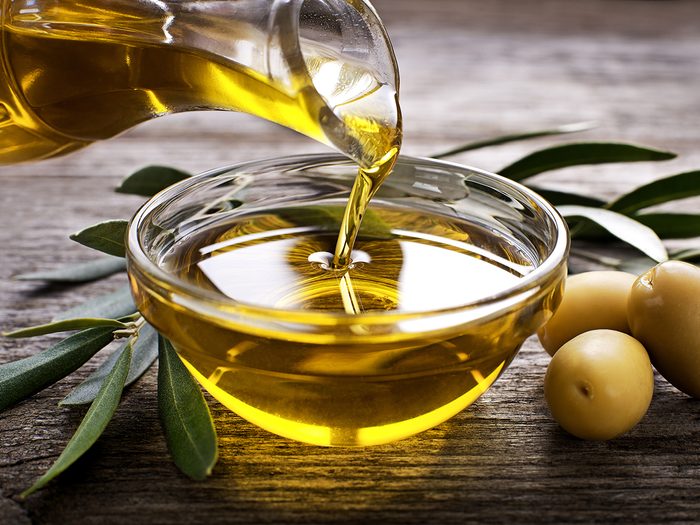If You Haven’t Switched to Olive Oil Yet, This Might Convince You

A new Harvard study reinforces past data suggesting this Mediterranean mainstay is brilliant for your body—and now, your mind.
It’s one of the most versatile condiments: A base for sautées, a dip for bread, a salad dressing, even a popcorn oil. It’s also one of the healthiest: The utility and rich flavour of olive oil have graced dishes for centuries, heralded in recent decades for the oil’s heart-healthy advantages.
Now a preliminary study from the Harvard T.H. Chan School of Public Health hints at the potential prowess of olive oil as a protective barrier against dementia. With global dementia rates rising as a large segment of the population ages, the role of olive oil to preserve cognitive health deserves a drop of inquiry.
The science behind olive oil and cognitive health
Dementia encompasses many conditions marked by severe impairments in thinking or memory. It’s estimated that nearly 750,000 Canadians suffer from some form of dementia, including Alzheimer’s, a relentless, progressive disease.
“With advances in modern medicine, many people are now outliving their brains,” remarks Kristin Kirkpatrick, MS, RD, LD, of the Cleveland Clinic, emphasizing the importance of brain health.
In summer 2023, Anne-Julie Tessier, PhD, RD, a nutrition postdoctoral fellow at Harvard, presented a preliminary study at the American Society of Nutrition’s annual conference in Boston that offers promising new insights in the fight against Alzheimer’s. The research suggests that consuming just over half a tablespoon of olive oil daily can reduce the risk of dementia-related death by an impressive 28%. “Our study reinforces dietary guidelines recommending vegetable oils such as olive oil,” Dr. Tessier stated in a press release. “These recommendations not only support heart health but potentially brain health, as well.”
Even more compelling is the evidence that replacing mere teaspoons of processed fats like margarine and commercial mayonnaise with olive oil cuts down the risk of dementia mortality by eight percent to 14%. Dr. Tessier added: “Opting for olive oil, a natural product, over these fats is a safe choice that may reduce the risk of fatal dementia.”
What’s the science behind this powerful gift from nature? “Some antioxidant compounds in olive oil can cross the blood-brain barrier, potentially having a direct effect on the brain,” Dr. Tessier explains. “It’s also possible that olive oil benefits brain health indirectly by benefiting cardiovascular health.”
Dr. Tessier noted that while the research suggests a link between olive oil and a reduced risk of dementia, it doesn’t conclusively prove this. Further in-depth studies, like randomized controlled trials, are required to verify these effects and to determine the best amount of olive oil to consume for maximum benefits.
That said, the connection appears promising. Another pivotal study from Harvard, published in the Journal of the American College of Cardiology in 2022, spotlights olive oil’s protective nature. It not only aligns with Dr. Tessier’s deductions about dementia but also points to a broader range of benefits. This study illustrates how olive oil can mitigate the risks of premature death, especially from conditions like cardiovascular and neurodegenerative diseases. Echoing this sentiment, Marta Guasch-Ferré, PhD, an author of the study and Associate Professor of Nutrition at Harvard, stated: “Swapping animal fats with plant-based oils can be a key to preventing chronic ailments and extending lifespan.”
Find out how magnesium may lower your dementia risk.
Embracing olive oil beyond cognitive benefits
The health benefits of olive oil spread far beyond brain health—it is credited with reducing chronic inflammation and might even inhibit cancer cell growth. Kirkpatrick compared olive oil with antioxidant-rich foods like blueberries and broccoli: “Olive oil tends to have a very high capacity of antioxidants,” she emphasized, highlighting its potential in cancer prevention.
Here are more high-antioxidant foods worth adding to your cart.
If you’re eager to incorporate more of this liquid gold into your diet, Kirkpatrick suggests a daily intake of one to three tablespoons, highlighting its versatility: Spritz olive oil on toast or drizzle it over a salad—but note that olive oils are not created equally. Opt for extra virgin olive oil for the best health benefits. Stored in a dark bottle, it should be tightly sealed after opening. Light and air can compromise the taste and quality of extra-virgin olive oil.
Next, find out how the MIND Diet meal plan can reduce your risk for Alzheimer’s.






